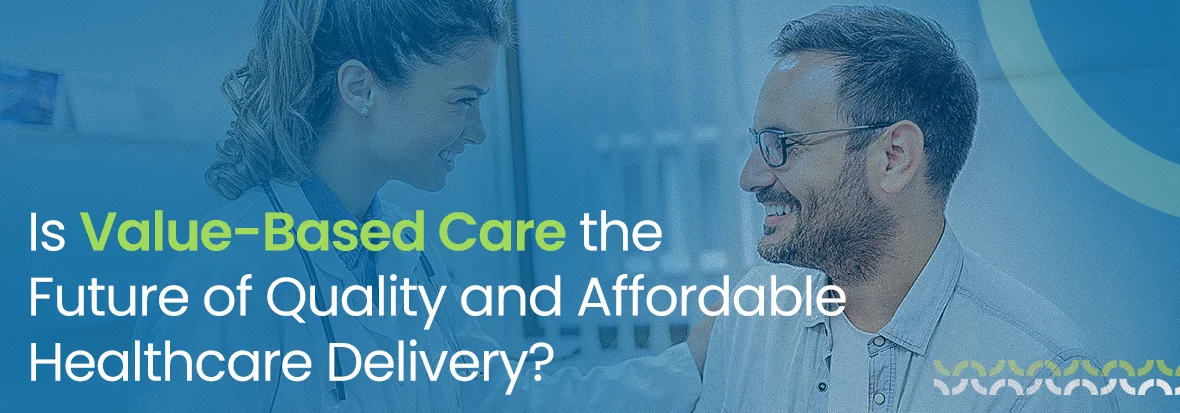Value-based care (VBC) is a transformative approach to traditional fee-for-service models, which is facing criticism for their inefficiencies and costly packages in the healthcare world. As patient expectation evolves, the demand for a system that prioritizes quality and affordability increases with time. So, VBC focuses on providing better patient outcomes that align with financial incentives at lower costs than rewarding providers based on the volume of services they perform. But is this model truly the future of healthcare delivery?
So, this blog explores the idea of value-based care as an affordable model to revolutionize healthcare by improving quality, reducing costs, and delivering fair access. We will look at value-based care, its benefits, and how it can benefit all healthcare participants.
Understanding Value-Based Care
Value-based healthcare is a reimbursement framework that incentivizes healthcare providers to focus on improving patient outcomes while controlling costs through quality of service rather than quantity. Value-based care represents a quality and affordable approach, rather than fee-for-service models, which focus on providers being compensated based on delivering high-quality care that improves patient health and outcomes while reducing costs. As even better outcomes can reduce the need for ongoing health care services, there is an improvement in patient health outcomes.
Key Principles of Value-Based Care:
- Patient-Centered Care: Tailored to each patient’s care and preferences.
- Collaboration Across Providers: Help to coordinate among specialists, primary care physicians, and support staff.
- Focus on Prevention: Prioritizing preventive measures and early interventions to reduce costly treatments.
- Data-Driven Decision Making: Through analytics and reports to monitor patient outcomes and improve care delivery.

Benefits of Value-Based Care
The value-based care model offers a range of benefits for patients seeking healthcare services, and the healthcare providers as follow:
- Positive Patient Outcomes:
As value-based care prioritizes patient wellness and outcomes over service volume, that leads to a positive patient response back always. As it always incentivizes providers to focus on quality of service over quantity when it comes to patient care and health.
- Cost Reduction:
One of the most significant benefits of VBC is to focus on keeping patients healthier, which in turn helps to reduce overall cost expenditure, by preventing hospital readmissions and unnecessary procedures. Example: As the key part of VBC Accountable Care Organizations (ACOs) have demonstrated success in reducing costs while maintaining or improving the quality of care.
- Patient Satisfaction:
Patients are more likely to benefit and be satisfied by a value-based care model. That improves patient communication and holistic treatment with the healthcare team. This streamlined approach often leads to higher satisfaction rates with cohesive care of patients.
Want to reduce your practice costs while enhancing care?
- Focus on Preventive Care
Value-based care encourages a proactive approach to health management, with regular screenings, vaccinations, and counseling for healthy lifestyles to cut down the severe health issues.
The Future Potentials of Value-Based Care
The future of value-based care (VBC) looks promising with evolving healthcare systems, driven by technology, policies, and rising patient expectations that improve the overall quality of care and outcomes with controlling cost. Providers specialized in value-based care have become more innovative with technologies like telehealth and remote monitoring that help to deliver improved healthcare services, enhance patient engagement, and reduce overall visiting costs. Better, these tools allow the providers to focus on preventive care, and with that, they can manage chronic conditions better, ultimately leading to improved health outcomes.
Governments and policy makers are also playing a pivotal role in VBC adoption, with initiatives like Quality Payment Program (QPP) and the expansion of Accountable Care Organizations (ACOs), which reward healthcare providers for delivering quality of care services, placing the patient’s health as the center of everything with cost reduction. At the same time, patients are always in demand of transparency, personalized care plans, and improved experiences, pushing providers to adapt to a more patient-centric model. By aligning technology, policy, and patient needs, Value-based care model is poised to redefine healthcare, focusing on outcomes rather than volume.
Value-Based Care In Demand:
Value-based care is experiencing significant growth both nationally and globally. Between 2019 and 2021, private capital investments in this care model increased over fourfold, while investments in traditional fee-for-service (FFS) systems, as indicated by stagnant hospital construction rates, have shown little growth. (source ) Projections for the future of value-based care remain highly optimistic, with expectations for continued rapid expansion. Over the past decade, 2.3 million more patients have transitioned to value-based care, moving away from the traditional FFS approach. (source )
Final Thoughts
Value-based care has the potential to revolutionize the way healthcare is being delivered by focusing on healthcare quality, affordability, and complete patient satisfaction. But, still it will take some time as with challenges around the road, but it’s rare in business where all parties (patients, payers, and providers) can benefit through a model. As by putting the patient care and satisfaction first, hospitals and payers can create a healthy environment and profitability go hand-in-hand. Trust MedCare MSO to ensure your smooth transition towards Value-based care model. Just contact us today and our medical billing team is here to support you on every step of the way.

